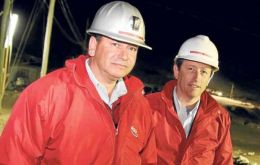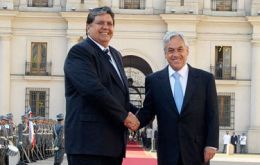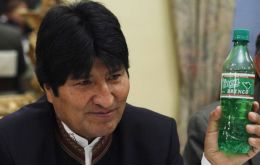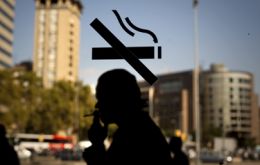MercoPress. South Atlantic News Agency
Latin America
-
Thursday, January 20th 2011 - 23:35 UTC
Chilean Commission Finds Mines Owners Responsible for Collapse

The Chilean commission investigating the mining disaster in the Atacama desert last year, has found the owners of the San Jose mine and the National Service of Geology and Mines responsible for the accident and the Chilean government free of any blame.
-
Thursday, January 20th 2011 - 18:35 UTC
Chile and Peru Best Time in Bilateral Relations

Chilean President Sebastian Piñera and Peru’s Alan Garcia agreed on Wednesday to downplay Lima’s suit against Santiago over maritime boundaries in favor of economic integration to combat poverty and underdevelopment. They instead outlined that bilateral relations are going through the best ever time, in term of relations.
-
Thursday, January 20th 2011 - 16:37 UTC
LAN Chile To Merge With TAM Soon

The Chilean airline Lan announced that it has agreed with the Brazilian airline TAM the terms for the merge of the two airlines, which will take place in the next six to nine months
-
Thursday, January 20th 2011 - 03:34 UTC
Unemployment in Latin America and Caribbean Falls in 2010

Latin America and the Caribbean experienced rapid employment recovery in 2010 to pre-crisis levels, but the challenge of improving the working conditions of millions of workers still remains, according to data provided by the ILO, which will hold its 17th American Regional Meeting in Chile next week with delegates from 35 countries of the continent.
-
Wednesday, January 19th 2011 - 22:45 UTC
Coca-Based Drink Launched in Bolivia

Coca Brynco was launched in Bolivia earlier this week. It is the first mass produced soft drink of its kind and the project is supported by the government of President Evo Morales.
-
Wednesday, January 19th 2011 - 22:39 UTC
Former Haiti Dictator Charged With Embezzling

Former Haitian dictator Jean-Claude Duvalier has been charged with embezzling public funds Tuesday, but a judge must still decide whether the indictment can proceed.
-
Wednesday, January 19th 2011 - 20:53 UTC
Standard Chartered Private Banking Assets in Latin America to Double

The UK's Standard Chartered will focus on serving Latin American clients in segments requiring direct access to Asia, Africa and the Middle East, the bank's head of private banking in the Americas, John Leto, told BNamericas, saying he plans to double its private banking assets in the region in two years.
-
Wednesday, January 19th 2011 - 20:42 UTC
Chile to Increase Smoking Ban

Chile’s Health Minister Jaime Mañalich announced his support this week for a more strict smoking ban.
-
Wednesday, January 19th 2011 - 00:43 UTC
Chile: After Seven Days of Manifestation Agreement Puts End to Gas Crisis

Chilean officials reached agreement Tuesday with the Citizens Assembly of Magallanes over an increase in natural gas prices that sparked a week-long general strike in the remote southern region, sources involved in the talks said.
-
Tuesday, January 18th 2011 - 17:52 UTC
Controversial Body Scanner to be Used Shortly at Ezeiza and Santiago Airports

The Body scanner will soon be used by the Airport Security Police (PSA) at Argentina’s main airport.
